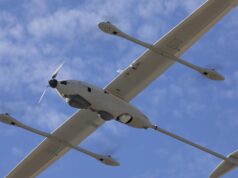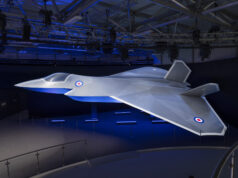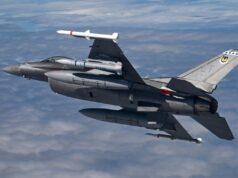The Polish Air Force has had the lead for the NATO Baltic Air Policing mission since the start of the year.
The Polish detachment under Lieutenant Colonel Adam Kalinowski operates four multi-purpose F-16 fighter aircraft out of Šiauliai Air Base, Lithuania.
“We have brought all the specialist personnel to ensure the proper functioning of the unit here at Šiauliai”, said Lieutenant Colonel Kalinowski, who is an experienced instructor pilot with almost 3,000 flying hours on fighter and trainer aircraft.
“This is the eight time the Polish red-white checkerboard performs the NATO mission over Baltic States, for the second time the F-16 jets from 31st Tactical Air Base in Poznan-Krzesiny have been tasked to accomplish this mission,” he added in a release.
Since their arrival in January, have conducted almost 40 scrambles out of Šiauliai including approximately ten so-called Alpha Scrambles.
 “We achieved successful intercepts of multiple Russian military aircraft flying from Russian mainland to Kaliningrad enclave or operating over international waters close to NATO airspace off the Lithuanian coast,” said Lieutenant Colonel Kalinowski.
“We achieved successful intercepts of multiple Russian military aircraft flying from Russian mainland to Kaliningrad enclave or operating over international waters close to NATO airspace off the Lithuanian coast,” said Lieutenant Colonel Kalinowski.
“In a twoship formation, our F-16s visually identified multiple Su-27, Su-24, Il-20, An-26 and Il-78 aircraft that were not on a flight plan. Each intercept was performed in timely and professional manner demonstrating Polish readiness and skills,” he underlined.
The Polish F-16 fighters were also launched for training flights during which the Polish pilots practices training approaches on multiple airfields within the region and intercepts in special training areas.
“So far my team conducted almost 300 training intercepts supported by Lithuanian Air Force L-39 Albatros aircraft and controlled by Baltic Control and Reporting Centre at Karmelava, Lithuania,” said Lieutenant Colonel Kalinowski.
“This type of training allows the Quick Reaction Alert interceptor jets to be launched within minutes to respond predictably and professionally to any unclear aerial situation.”














And so they should be. More nations need to spend the money and take care of the skies in and around there own nations. Cough Ireland.
Countries with small economics , like the Baltic States and Ireland, cannot afford advance fighter jets like F-16’s and Typhoon’s. It would be totally uneconomic to set up all the infrastructure just for a few jets!
No, but they could provide a nominal payment to those nations who do police their skies for them – just to say thanks.
I’m curious as to how these Deployments are funded (1) By the participating nation – in this case Poland (2) From a pool of money allocated specifically for these missions provided by NATO (3) By the Baltic States themselves or (4) a combination of all three. Yes for the Baltic States to set up this capability from scratch is probably too much of an expense but maybe an arrangement similar to the Operation of NATO Sentry E3’s out of Geilengkirchen might be an option.